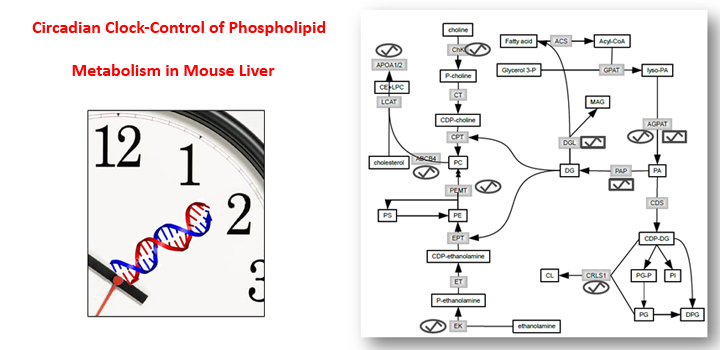Gorne L et al. 2015, Chronobiol Int.
The circadian system involves central and peripheral oscillators regulating temporally biochemical processes including lipid metabolism; their disruption leads to severe metabolic diseases (obesity, diabetes, etc). Here, we investigated the temporal regulation of glycerophospholipid (GPL) synthesis in mouse liver, a well-known peripheral oscillator. Mice were synchronized to a 12:12 h light–dark (LD) cycle and then released to constant darkness with food ad libitum. Livers collected at different times exhibited a daily rhythmicity in some individual GPL content with highest levels during the subjective day. The activity of GPL-synthesizing/remodeling enzymes: phosphatidate phosphohydrolase 1 (PAP-1/lipin) and lysophospholipid acyltransferases (LPLATs) also displayed significant variations, with higher levels during the subjective day and at dusk. We evaluated the temporal regulation of expression and activity of phosphatidylcholine (PC) synthesizing enzymes. PC is mainly synthesized through the Kennedy pathway with Choline Kinase (ChoK) as a key regulatory enzyme or through the phosphatidylethanolamine (PE) N-methyltransferase (PEMT) pathway. The PC/PE content ratio exhibited a daily variation with lowest levels at night, while ChoKα and PEMT mRNA expression displayed maximal levels at nocturnal phases. Our results demonstrate that mouse liver GPL metabolism oscillates rhythmically with a precise temporal control in the expression and/or activity of specific enzymes.
Autores: Gorne L, Acosta-Rodriguez V, Salvador G, Pasquare S, Giusto NM, Guido ME
Artículo: Gorne et al, Chronobiol Int. 2015 Feb;32(1):11-26



